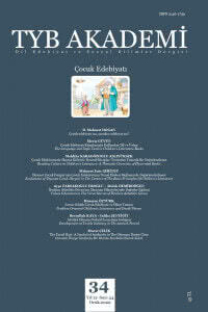Nurettin Topçu'nun Türkiye'nin Maarif Davası İsimli Eserinde Eğitimin Güncel Sorunları
Nurettin Topçu, çağdaş düşünürlerimizden biridir. Eğitim ve kültür alanında yazılar yazmış, yayın faaliyetlerinde bulunmuştur. Türkiye'nin Maarif Davası, onun eğitim üzerine yazılarının toplandığı eseridir. İsminden de anlaşılacağı üzere, Topçu bu eserinde, felsefi anlamda eğitimi değil, Türkiye'nin eğitim sorunlarını ele almakta, bu sorunlar çerçevesinde öğrenci, öğretmen, program gibi eğitim temel öğeleri üzerindeki görüşlerini açıklamaktadır. Ona göre, eğitim tarihimizde çeşitli kırılmalar yaşanmıştır. Bu kırılmalar, on ikinci yüzyılda felsefenin medrese programından çıkarılmasıile başlamış; eleştiriye ve bilimsel düşünceye kapalılıkla sürmüş, giderek doruk noktasına ulaşmıştır. Bir zamanlar gerçek bir eğitim öğretim yuvası olan medrese, Osmanlı'nın son dönemine doğru bu işlevinden uzaklaşmıştır. Cumhuriyet döneminde de, Topçu'nun "milli mektep" olarak adlandırdığı ahlak ve kişilik eğitimini öne çıkaran bir eğitim tarzı yerine, fen ve teknik eğitimi önceleyen pozitivist ve pragmatist bir eğitim anlayışı benimsenmiş, başlıca Batı'yı taklit üzerine oturan bu eğitim sisteminde de bir başarı sağlanamamıştır. Nurettin Topçu, söz konusu bu eserinde eğitim ve kültür tarihi perspektifinden Türkiye'nin eğitim sistemini gözden geçirir, bir tür zihin eleştirisi yapar; bunu yaparken de eğitimin ne ve nasıl olması gerektiği sorusuna cevap arar. Bu makalede, Nurettin Topçu'nun, söz konusu eseri, günümüzün eğitim sorunları açısından okunmaya çalışılacak, öne çıkan eleştiri ve çözüm yolları ele alınacaktır.
The Actual Problems İn Nurettin Topçu's Work Entitled The Educational Claim Of Turkey
Nurettin Topçu is one of the contemporary thinkers of Turkey. He wrote down articles in the fields of education and culture and also took part in publishing areas. Türkiye'nin Maarif Davası (The Educational Claim of Turkey) is a book that gathered his writings on education. In this work, he doesn't treat education as a philosphical way, instead he discusses the educational problems of our country and as part of these problems he expresses his views on basic elements of education such as student, teacher, curriculum etc. According to Topçu, it has been experienced several breaks in our history of education. These breaks started with the removal of philosophy from madrasah curriculum in the 10th century, continued with the seclusion from scientific and critical thinking and this break gradually reached its peak. Once madrasahs had been true educational centers, but then they backed out of this function in the last period of the Ottoman Empire. In Republic period, instead of an educational method which brings out self and character education that Topçu named as "Milli Mektep-Milli Maarif" (National School-National Education), a pozitivist and a pragmatic educational concept which gives priority to technical and scientific education was embraced. However, no success was gained in this educational system that basically imitates the western methods. In this article, Topçu revises educational system of Turkey from the perspective of history of education and culture, he makes a kind of criticism on mentality and while doing this he seeks answers to the questions such as "what is education? How should it be conducted?" This work will be able to be read from the perspective of actual educational problems of Turkey and prominent formulas and critiques will be dealt.
___
Akyüz, Yahya, "Türkiye'de Öğretmen Yetiştirmenin 160. Yılında Darülmuallimîn'in İlk Yıllarına Toplu ve Yeni Bir Bakış." Ankara Üniversitesi Osmanlı Tarihi Araştırma ve Uygulama Merkezi Dergisi, 20, ss. 17-58, 2006Sönmez, Selami, Terbiye ve Tarihte Taklit. Bayburt Üniversitesi Çağın Sorunları Karşısında Eğitim Sempozyumu, 2014
Tozlu, Necmettin, Kültür ve Eğitim Tarihimizde Yabancı Okullar, Ankara, Akçağ Yayınları, (1991).
Topçu, Nurettin, Türkiye'nin Maarif Davası. İstanbul, Dergâh Yayınları, 1998
- ISSN: 2146-1759
- Yayın Aralığı: Yılda 3 Sayı
- Başlangıç: 2011
- Yayıncı: Mustafa Ekici
Sayıdaki Diğer Makaleler
Eğitim Programları ve Öğretim Bilim Dalı Alanında Lisansüstü Eğitim Çerçeve Program Önerisi
Öğretmen Yetiştirme Üzerine Düşünceler
Türkiye'de Öğretmen Yetiştirme ve Öğretmenlik Mesleği Politikaları
Siyasi Parti Programlarına Göre Eğitim Politikaları
Gönüle Uzanan Eğitim: Milli Eğitim
Nurettin Topçu'nun Türkiye'nin Maarif Davası İsimli Eserinde Eğitimin Güncel Sorunları
Türkiye'nin Eğitim Paradigması ve Yeni Paradigma Oluşturma Zorunluluğu Üzerine
